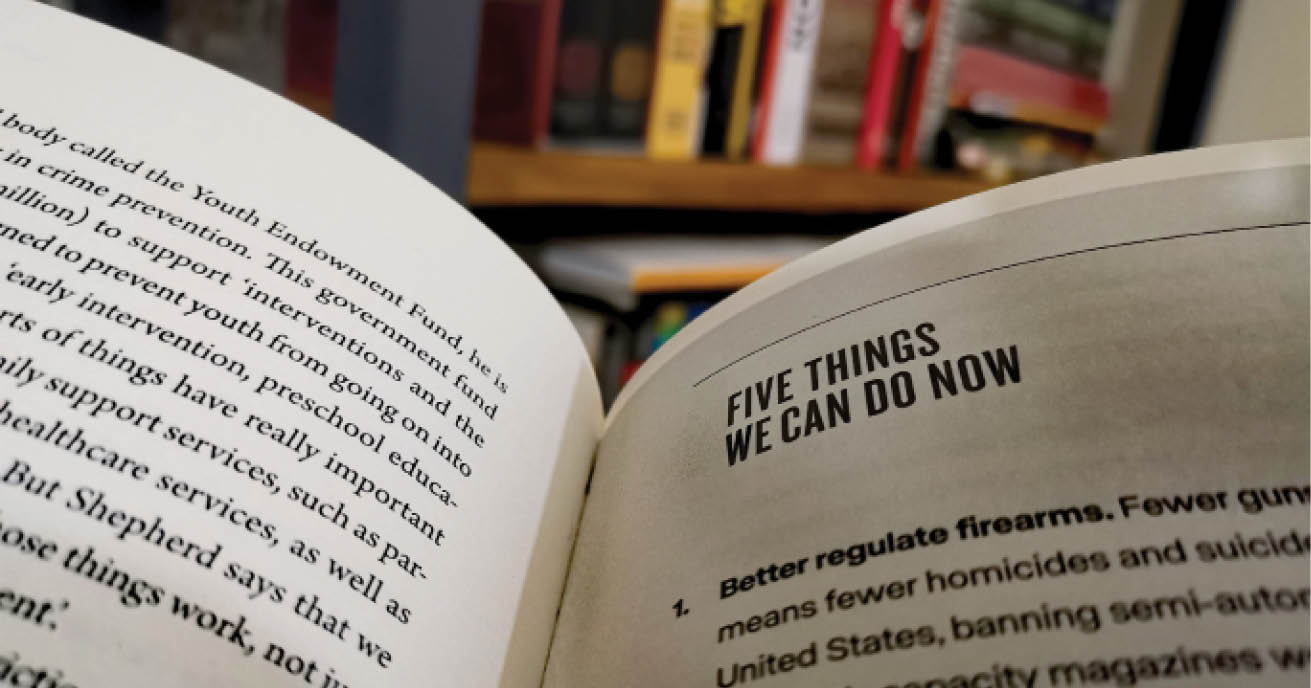Now, the trouble with Nigerian leaders (and I use this term loosely), is that we seem to have a collective, limited attention span, so chronic that it borders on laziness. Laziness to move, do, or even think in the direction of solving any problem, even if it’s one that threatens our very existence, like violent crime. And that’s when I became particularly engrossed in Andrew Wear’s book, ‘Solved’, at chapter three, called ‘Partners in Crime’. There, he takes a look at the United Kingdom’s history of violence and crime, as well as its present state of being one of the safest countries in the OECD, that Paris-based international organisation of 36 countries “committed to democracy and the market economy”.
Wear goes on to point out how demographic factors play a large part in influencing the rate of violent crime: “Young people are disproportionately the victims and the perpetrators of violence, so where there is a higher proportion of young people in a country, there tend to be higher homicide rates.” Conversely, he continues that while cities generally have a slightly higher homicide rate than rural areas, the crime rate is decreasing faster in cities than it is elsewhere.”
- The journey to achieving universal health coverage in Nigeria: Challenges and prospects
- Atletico Madrid need win at rivals Real to boost title tilt
This immediately reminds me of the still-fresh horror of the 23 travellers burnt alive by bloodthirsty terrorists in Sabon Birni of Sokoto State. Then factor in Kaduna State’s Birnin Gwari, some parts of the state’s South, and the villages that dot the Abuja-Kaduna highway, and throw in any random insurgency hotspot in Niger State, and it would all ring true for us Nigeria.
Wear still goes ahead to mention the usual suspects like small arms proliferation, and so on. In his examples of the UK, he also mentions the importance of gear and equipment – especially protective – for law enforcement personnel like the police. It is a fact which makes me ponder what the average policeman in Nigeria wears for work, even in high-risk areas, like the place where a trio of cops were beheaded and filmed by the terrorist organisation Eastern Security Network (ESN). The sad, scary, and dangerous truth about Nigeria today is that criminals are quite literally getting away with murder. But I digress.
Back to ‘Solved’, it is clear that there is too much invaluable info, such that one couldn’t possibly compress into a half-page column. Maybe I will just stick to some of the practical solutions he offered, which he called ‘Five Things We Can Do Now’. First, better regulation of firearms, but unfortunately the solutions were for the unique problems of the West which aren’t directly applicable here, but can be adjusted to. Second on his list, is an improvement of detailed data collection that informs the development of effective responses.
Thirdly, Wear posited for the development of a collaborative approach to combating violence, because “No single agency can address violence effectively”. He suggested establishing partnerships between law enforcement/security agencies, something we have tried in Nigeria, to frankly disastrous results. An overhaul might help, to be honest.
Fourth on the list, is an increase in hotspot policing, since violent crime takes place in and around particular places. Targeting security efforts and resources in these areas, he said will effectively reduce crime. Now, this has been proven here, on the Abuja-Kaduna highway, but only as a result of a major incident, and not too long after. See the pattern? We actually have good ideas and approached here in Nigeria, but our main problem is sustaining them.
The fifth item on the list will certainly be helpful for large cities, as Wear suggested a tightening of venue licensing, particularly those frequented by young men. “Ensuring that there are sufficient powers to close down or restrict trading hours of problem venues will address the conditions that enable violent altercations.” This, also, is something that’s done in one form or the other here, but which laziness and corruption have eroded.
I have focused on security issues in the book because, obviously, those are of greatest concern to me right now. But within its pages, ‘Solved’ makes a good effort into living up to its name, and I’m the richer for reading it. Something which the author does, which earned him my respect, is an unashamed acknowledgement of the potential problems and possible failings of the proffered solutions. He, in a simple and practical way, simply holds up each one as a point of inspiration and direction for other nations.
In the final analysis, it is quite an engaging book; one I hope those at the helm of our country’s affairs will chuck laziness aside and give a well-deserved look. I know, it certainly cannot save the world’s problems, but it won’t hurt to try. Even as I wrap this piece up, all my thoughts about Wear’s excellent book brings to mind a reprehensible quote that I abhor, and whose true origin remains murky – and which comes across quite like self-afflicted racism – which goes ‘the best way to hide something from Black people is to put it in a book’.
(Concluded)

 Join Daily Trust WhatsApp Community For Quick Access To News and Happenings Around You.
Join Daily Trust WhatsApp Community For Quick Access To News and Happenings Around You.


